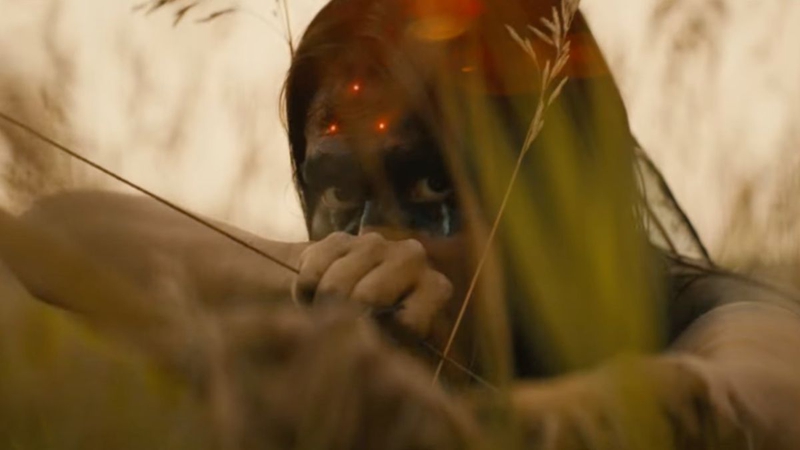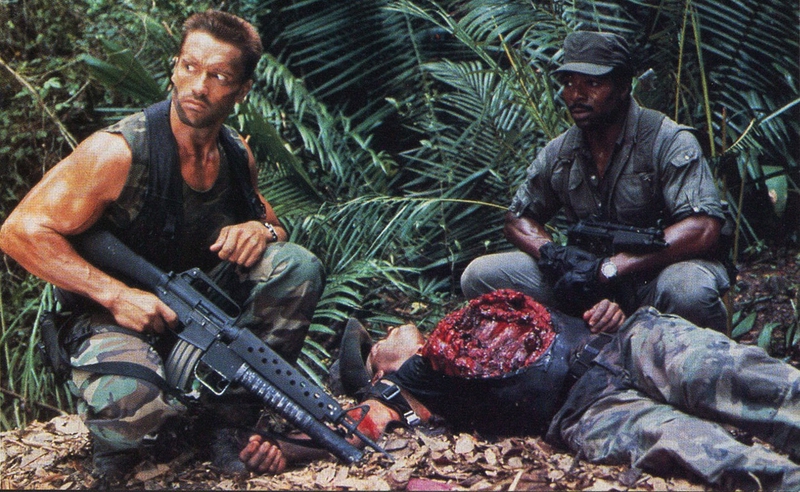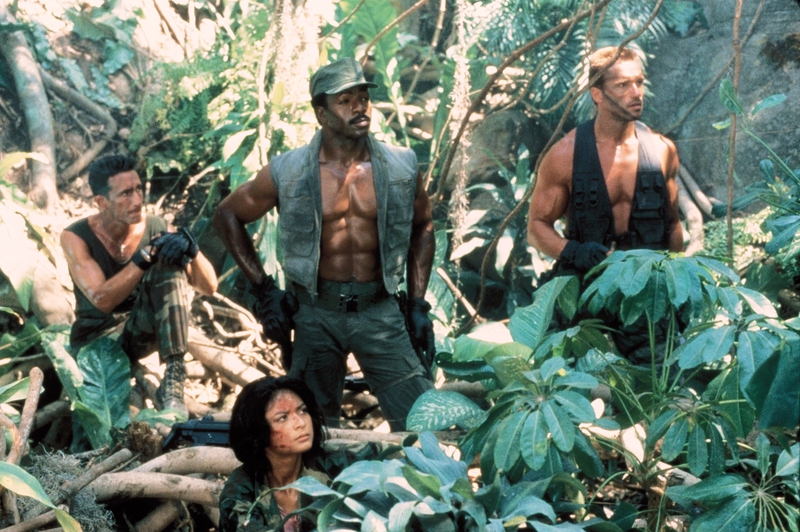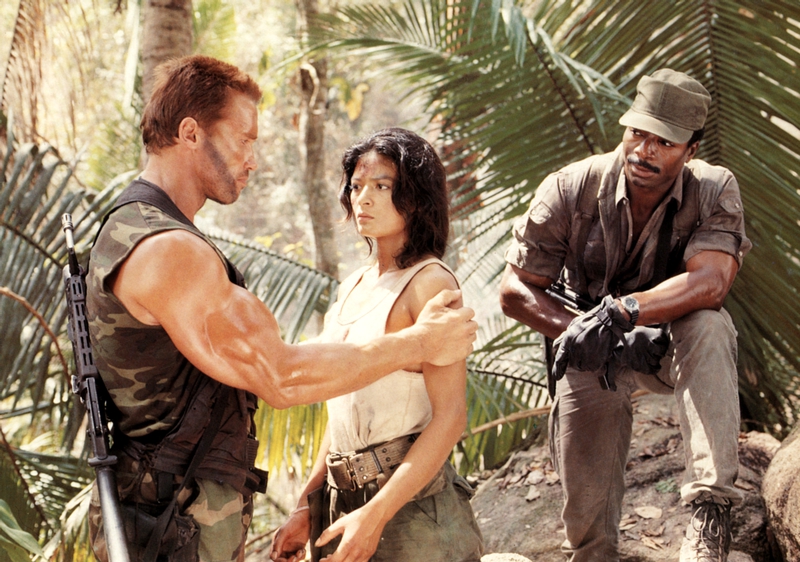Prey, the latest installment of the Predator franchise, has come under fire from some fans for being "too woke," with accusations of pandering to modern cultural and gender politics. One of the criticisms has been that it's beyond the boundaries of believability to have a young, indigenous female beat the mythic yautja. After all, it took Arnold Schwarzenegger to beat the Predator in the original, and that film didn't waste time with political proselytizing. Why couldn't Prey be more like that?
If Prey were more like Predator, we might've seen a very different film — but perhaps not in the way critics of Prey might expect. The original Predator is widely considered one of the best examples of testosterone-driven '80s action cinema — a classic of both the era and the genre — but on re-examination, Predator can also be seen as a critique of masculine stereotypes in cinema; one that skins them alive and leaves them to be picked over by birds. Because, whether intentional or not, Predator does have a lot to say about gender politics and in particular, the toxicity of masculine stereotypes, the institutions they help to maintain, and the treatment of women within them.

While it might seem ludicrous to suggest Predator is an intentionally "woke" film, there's a case to be made that Predator is a deliberate critique of the harmful masculine stereotypes and cinematic conventions that proliferated the action films of the era. That Predator can both critique these conventions while also being one of the best examples of the genre it's criticizing isn't unique, but it might still be surprising to some to consider the film in this light.
While Predator doesn't appear to be an overtly political film, it was made in a rapidly changing political climate. The Iran-Contra affair — the CIA's funding of the Nicaraguan Contra Rebels through the illegal selling of arms — was headline news and undermined the American people's trust in their government. Considering this, the setting of Predator, with its KGB-funded mountain rebels, takes on a new political dimension, albeit with some roles reversed. The CIA are notably not the good guys in this film, as they might have been just a few years previously, and the growing sense of public mistrust undoubtedly influenced this less-than-favorable portrayal.
If the setting and real-world political climate aren't enough to convince you of Predator's political leanings, a closer look at the characters and the narrative might.
CIA man Dillon — the main human antagonist, the one responsible for dropping them into this "meat grinder" — underscores the hierarchical dynamics of the film. Dillon is no longer military, but his authority exceeds everyone, to the point that he is ostensibly in command. In this regard, Dillon represents the top tier of this world (a world which, oddly, appears to have as many women as it does hyper-advanced xenomorphic killers) and within it Dillon is the embodiment of a government that will send you to your death to achieve its ends. Predator tells us, quite clearly, that the government and its institutions are not to be trusted.

Dutch, despite his physical prowess, represents the everyman. He is seldom referred to as "Dutch" by his men; instead he's addressed as "Major," his military rank, but despite this, he comes across as almost a blue-collar worker, a straightforward guy doing the ugly jobs no one else will do. He predominantly calls his men by their first name or their nicknames, which humanizes them and shows us he trusts them. Dutch might have his suspicions throughout the first act that there is more to the mission than both Dillon and General Phillips are telling him, but he retains the belief and trust that they – and by extension, the institutions they represent – won't screw him over, just as he would never betray his men. Dutch then isn't simply a powerhouse super-soldier, he's also the average American working man who has bought into the mythos of the American Dream.
While Dutch may represent the average Joe who occasionally unleashes his righteous violence on his enemies, he does adhere to a code of conduct. Part of this code is to only undertake search and rescue operations; a moral decision Dutch has made that his team abides by and vicariously upholds. It's this morality that allows them to be somewhat extrajudicial when dispensing violence. The moral justification for violence is a large part of what makes toxic masculinity so toxic as it extends an ethical pass when it comes to shooting faceless Brown "half-assed mountain boys" with a minigun, as long as it is being done for the right reasons. Dutch's team may bear the semblance of the moral high ground – Predator allows for this slaughter because it's told us these are the good guys and they think they're rescuing hostages – but there are a lot of people of color in this film serving as homogeneous cannon fodder to achieve the team's aims.

When it's revealed that the rebels are Communists planning "something big," Dutch gets to have his moment of indignation about having been lied to, but the horrific body count we just witnessed is still considered morally justified. Part of the deal we make as the audience when reveling in the team's toxic, gung-ho masculinity, where our heroes back-slap and wisecrack their way through the carnage, is to accept and permit the slaughter, as long as the moral and ideological excuses for it are upheld.
Similarly, the yautja in Predator has its own moral code and kills with its own kind of justification. To a Predator, an armed or aggressive human is fair game, while an unarmed, passive target remains out-of-bounds. The yautja's code is scoffed at by Dutch, but he fails to see the irony that his own code allowed him to justify the killing of the rebels. This makes our protagonist no different from his enemy, his justification for killing is just a different interpretation of what is honorable. The view that holding a different ideology from one's own is grounds enough to excuse killing, is a dangerous message.
However, this isn't the message Predator is putting out there. Instead, it seeks to subvert this notion by making the traditional heroes as vulnerable as the mountain rebels they so easily decimated or Anna, their bound female hostage. Dutch's team is full of bravado, yet they're the unwitting instruments of the CIA; they're full of arrogance, yet unaware they've already been written off as expendable.

The yautja is an extension of that metaphor. It treats Dutch's team (and thereby notions of male superiority) with the same lack of regard men have traditionally afforded to women and minorities. It has no interest in their lives, relationships, needs, or struggles; it simply wants to hunt them and feels entirely justified in doing so.
It's often pointed out that because of the physical and technological inequity between the Predator and its prey, the yautja isn't fighting fair. It's cheating. However, this isn't accidental. Any struggle against a discriminatory and oppressive system is never fair, and that's what the yautja represents in Predator. Even the fact that the yautja is, for the most part, invisible can be viewed as a metaphor for fighting institutions so vast and nebulous as to be virtually impossible to attack directly. Even bringing the full weight of their firepower to bear, the team barely scratch it.
While it may present a contradiction to have both the protagonist and antagonist represent the same ideology, the men of Dutch's team and the predator critique different aspects of gender politics. Dutch's team represents a kind of blue-collar brand of toxic masculinity, but the Predator itself is The Patriarchy, which shows us just how unforgiving and indiscriminately oppressive these systems are. Dutch and his men are just as much victims of these systems as those they help to oppress.

Dutch's team, while ethnically diverse, are mostly fairly crude racial and cultural stereotypes, as well as varied representations of hyper-masculinity. Even Hawkins represents the masculine stereotype of the nerd who longs to be accepted by the bigger, stronger men. While his place in a group of otherwise overtly "alpha" males might seem odd, his presence reminds us that toxic masculinity affects all men, as shown by his use of deliberately sexist humor as an attempt to win the approval of the others. But, even though he's accepted into the team, he's never treated as an equal. He's the "beta" in the pack, the incel inside, and when Dutch sets him after the fleeing Anna, it's with a whistle one might reserve for a trained dog. Rather than physically force her, Hawkins pleads with Anna to return before being rendered unrecognizable by the yautja's attack. There's the implication this was an act of "weakness," and he's paid the price for it.
The rest of the team are all representative of aspects of toxic masculinity. Blaine, with his compensatory "Ol' Painless" minigun and chewing tobacco, spitting homophobic slurs. Poncho's cool, calm, "nice guy" also makes homophobic jokes and threatens Anna. Mac, his true affection towards Blaine so repressed that his grief and rage not only endangers the team, it gets him rather spectacularly killed. Billy's tracking skills and vaguely Native American superstitions make him the epitome of the "ethnic magician" trope, so utterly consumed by his need to prove himself in combat, to have a warrior's death, that he literally throws his life away.

Anna, the only woman in the film (Bechdel Test: Failed), is introduced to us by being hit in the face with a rifle. She spends almost the entirety of her screen time tied up and shoved around. Her one substantial piece of dialogue does very little to enhance her character or further the plot. Instead, her role reveals only the character of the rest of the team members, but none of her own. Only when Dutch cuts her bonds is there any concession to her humanity. But Dutch treats Anna as an equal because he suspects the Predator cannot make the distinction between them, and so neither should he. It's an important moment in the film because it recognizes their situation: Despite being a woman and having a different ideology, Anna is no different to them.
By the last act of the film, Dutch is alone. The team have all been decimated by the Predator, either through their arrogance, pride, or stupidity. Mac's thirst for revenge for his fallen comrade, Dillon's attempt to settle a score, and Billy's need for honor, are all motives fueled by toxic notions of masculinity.
The final confrontation between Dutch and the yautja sees it attempting to even the fight by disarming itself. Schwarzenegger was undoubtedly one of the most physically impressive people on the planet at this time, but even without weapons, camouflage, and optical enhancements, it's clear this is still not a fair fight. The Predator is not outsmarted, nor is it physically bested, but rather, Dutch can only incapacitate it through blind luck. Even as it lays dying, the yautja is intent on killing, even though it no longer serves any purpose. Just like The Patriarchy and the toxic masculinity it engenders, the Predator – itself a metaphor for the brutality of these systems – is not only hard to take down, it would rather scorch the earth than concede.
By showing these masculine stereotypes and action tropes and how they ultimately fail the team in Predator, we see how patriarchal systems and structures can be not only toxic and detrimental, but they're also, by their very nature, inequitable, vulnerable, and ultimately endanger those who participate in them. Conversely, Prey shows us that if we fight against these harmful notions of what constitutes masculinity, we can overcome them.
Remember, there's something waiting in those trees…and it ain't no man.
Prey is now streaming on Hulu.






